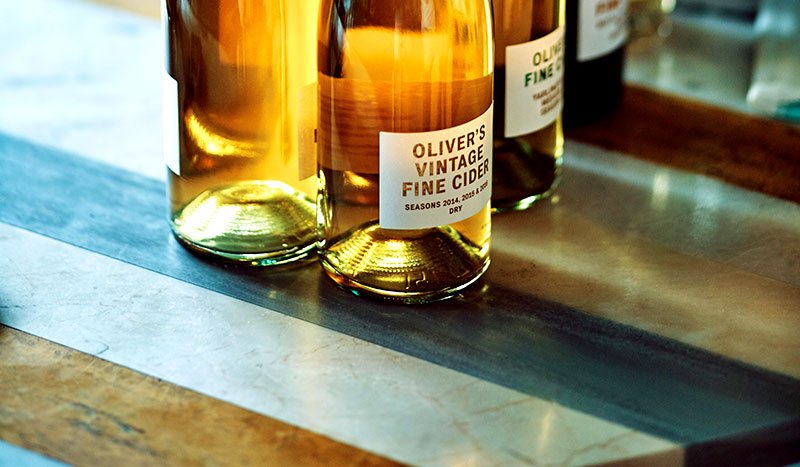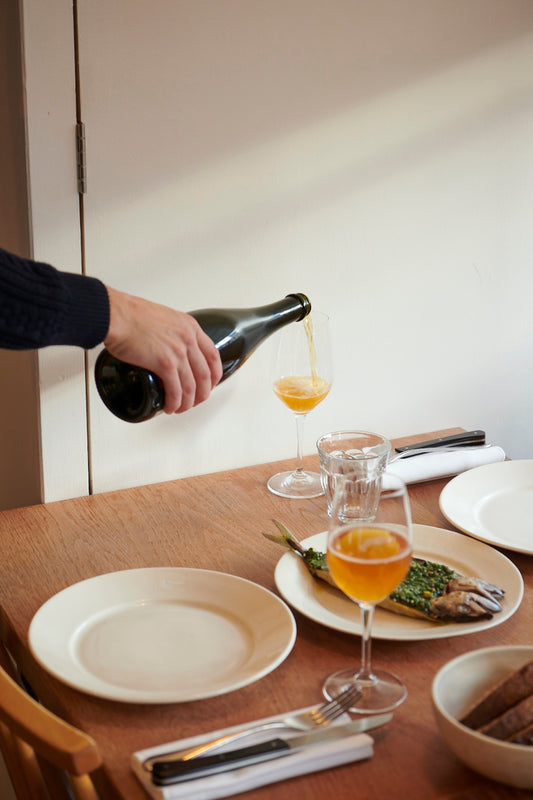
#2 - Cider Categories 101
Share
Our last email gave you a brief, but broad, run through of what makes fine & mass market cider so different! But to look at it the other way round, what do they have in common? Well, they all start with the apple (even concentrate was once an apple) which is pressed for its juice, so the maker can ferment at least some of the sugars in the juice into alcohol. The fermentation is done by yeasts - which can be wild (meaning those already there in the juice/cidery) or inoculated (meaning bred in a lab & added by the maker).
We'll delve into the many methods cider makers can use for alongside and after fermentation in later articles, but for now let's enlighten you about the three main categories of cider:
Mass-Market Cider
This is what most people think cider is, & why wouldn't they, you'll come across it more than anything else. But historically, it's actually a fairly new creation; being the ever-advancing creation of huge cider companies, perfecting the means of making industrial volumes of cider cheaply & consistently, over recent decades. These are the cider brands that most people are familiar with, typically sold by the pint & often described in the same way: "fizzy", "sweet", and "apple-ly". Usually, such makers will blend lots of apple varieties together to make their cider, and take their products through a lot of stages, controlled by science; both the processes used & the aims of the makers mean the results are all pretty homogeneous. This industrial approach to cider making does allow for a consistent taste, and using concentrate lets the maker produce it all year round, which is no doubt good for business (this requires less storage space, & they can make more as and when required).
Increasingly, in the name of 'innovation', this means adding other fruit flavours, not just using apples. While there is nothing wrong with this, it does seem to mean we have lost touch with all that cider can be - what it is at its heart - and the dominance of this kind of cider has pretty much shut the door on other kinds of cider making over recent decades. And in our opinion, the way such cider is made removes the potential for more complex cider flavours, aromas, styles, and simply more enjoyment for those who drink! Both Farmhouse and Fine cider do have the potential for complexity that variety brings; varied apples, varied seasons, varied methods, & a whole array of small makers, not just a few big ones.
Farmhouse Cider
Traditionally made by farmers, with apples from the orchards on and around their farms: a farmhouse cider is typically made with close to 100% fresh apple juice (it is sometimes known as 'real cider'). Such ciders can be big on flavour in comparison to mass-market alternatives; partly as they haven't been diluted with water, but also as they tend to be made with traditional cider apple varieties. The methods and knowledge used to make farmhouse cider are often passed down the generations, and trace back to the days when farm labourers would have been paid in cider. At times, some makers could be said to adopt a rudimentary approach to making their cider; almost like the original version of minimal intervention making, leading to varying results in the finished bottle - where old barrels might be used, or fermentations left unwatched, some of these ciders may end up a little acetic (vinegary) - on other occasions, the cider can be exceptional!
You might have come across a good few farmhouse ciders; served in country pubs, on holiday in Devon, Cornwall or Somerset, or at local festivals. They are usually still and dry, because that's what happens if you let apple juice ferment and do nothing to stop it; the fermentation will keep going until it has converted all of the sugar in the juice into alcohol, and once the sugar has been converted, the cider will be dry! As for being still, well people sometimes find it surprising that all cider starts out still - the bubbles have to be added; either by sealing the gas the fermentation process give off, in the bottle, so it is forced into the liquid, or by the maker adding it artificially through carbonation!
(New Wave) Fine Cider
Fine Cider is not a new thing - it's probably better to think of it as a forgotten thing, that is being rediscovered! And there's nothing to say that a farmhouse cider can't turn out to be damn fine, but there are a few differences. In a similar fashion to farmhouse cider makers, fine cider tends to use 100% fresh-pressed apple juice. The real difference comes in the making, everything that surrounds the juice, from when the apples are pressed, to how the juice is cared for as it ferments, and what happens to it after the fermentation has finished. These new wave makers basically take a mix of past methods, combine them with some modern knowledge, and aim to create a finessed version of farmhouse cider. For example, being very selective about the apples & pears they use; not just which varieties, but how they were grown. They also dig deep into their chosen methods of cider making, so they understand how they work in detail; as if they are to make truly good cider year after year, they have to understand what is making their cider turn out well, and what isn't.
The results of such wonderful, passionate cider makers, testing & pushing the boundaries in this way, means the world of fine cider is a broad spectrum, full of different tastes & styles, giving you lots to choose between, & many things to love! Just as you might know a few grape varieties you really like to drink, you can get to know certain apple varieties & their characteristics. Whether you want a little glass of something naturally low in alcohol with lunch, or a 'Champagne Method' cider, a still and dry cider to pair with your dinner, or an exceptionally succulent sweet cider for after dinner (to mention but a few of the options...), there is a fine cider that has been finessed to delight you. And as any Pommelier will tell you, it's more than possible to swap out wine for cider at the diner table; if anything, cider can pair better and more broadly with food than wine!


